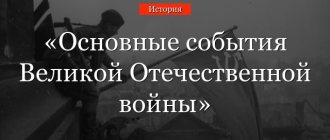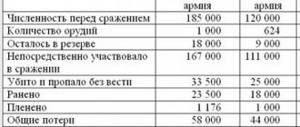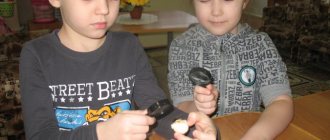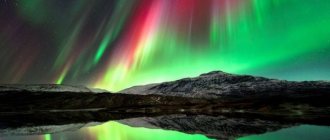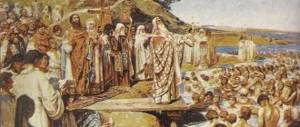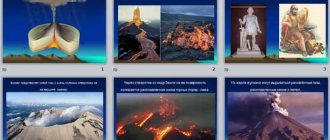- Reports
- Story
- The Great Patriotic War
On June 22, 1941, the most terrible and bloody war in the history of the USSR began. Hitler's troops and the armies of Nazi Germany's satellites attacked the Soviet Union without declaring war.
From the first days of the war, everything could have ended in disaster for our people. According to the Ost plan, the Slavic states were to be divided into the subjects of Greater Germany, and their population was sharply reduced and turned into slaves, deprived of all human rights and freedoms.
But our people withstood the first onslaught of the German army. The general battle was fought in the winter of 1941 near Moscow. For the first time in the history of World War II, the Soviet army defeated the main military forces of Germany. The capital of the USSR was saved, although at the cost of enormous sacrifices.
But Hitler could not be broken by one battle. He threw his troops onto the Volga and in the winter of 42/43 heavy and bloody battles began in the city of Stalingrad. Both Stalin and Hitler threw more and more parts into this meat grinder. Only thanks to the dedication of the Soviet people, thanks to self-sacrifice and selfless love for the Motherland, Soviet troops were able to defend Stalingrad.
But there was another colossal atrocity: Leningrad. Nazi troops surrounded this city and kept it under siege for more than three years of the war. Leningraders were dying of hunger, but did not give up, showing miracles of fortitude and courage.
Only after the Battle of Kursk was the German military machine completely broken and its large-scale retreat to the west began. In 1944, the territory of the Soviet Union was completely cleared of enemies. The foreign campaign of the Soviet army began. In 1944, 10 “Stalinist strikes” were carried out - in one year, 10 European capitals were liberated from the rule of Berlin. On May 9, 1945, the Red Banner of Victory was hoisted in Berlin over the Reichstag dome. The Soviet Union and its allies celebrated victory.
A victory that came at the cost of 27 million lives of Soviet citizens. A victory that gave the USSR power and strength, but its price was too high. Remember this war, learn its lessons and God forbid it happens again!
Causes, stages, periods, results of the Great Patriotic War
Prerequisites
At the end of the First World War, Germany experienced an economic crisis. Since the beginning of Adolf Hitler's reign and the Reformation, Germany's position has improved.
As a result of military operations in 1939, German troops attacked the territory of Poland and with this event the Second World War began.
In a short time, Germany conquered a large number of territories, but did not attack the USSR. Back in 1939, a non-aggression pact was signed between Germany and the USSR. After two years of the pact, Hitler broke his promise. Under the command of Hitler, it was planned to carry out a blitzkrieg, which involved conquest in the shortest possible time.
The company, which was established for a couple of months, was not crowned with victory, and the war began to be protracted.
Periods of war
First period (1941-1942)
At first, the USSR lost the war on its territories due to a surprise attack by Germany. The main battles at the initial stage were:
- Battle for Moscow
- Leningrad blockade
After the Battle of Moscow, the Germans suffered a crushing defeat and their troops were pushed back more than 200 km from the capital. The Moscow, Tula and Ryazan regions were completely liberated.
Radical change (1942-1943)
In November 1942, the USSR counter-offensive began to take place. Soviet troops continued their offensive throughout the occupied territory, pushing back enemy troops. One of the main battles is the Battle of Stalingrad. As a result of the battle, the Soviet Union managed to turn the tide in its favor.
The key battle was the Battle of Kursk. After the victory at Kursk, Germany lost the ability to conduct strategic offensives.
Third period (1943-1945)
In a short period of time, Germany managed to regain its strength, the Wehrmacht troops were still inferior to the Soviet ones, and the USSR continued to have a dominant role during the war. The Soviet army continued to move towards Berlin, liberating the occupied territories.
At the beginning of 1944, the siege of Leningrad was lifted, which lasted 872 days. Several successful campaigns were carried out and the USSR troops marched towards Germany. As a result of the battle for Berlin on May 8, the Germans signed an act of unconditional surrender.
Results
The triumph of the USSR came at a cost of great losses. The country's economy worked on military infrastructure and after that the country fell into crisis. As a result of the war, many people died, a significant territory of the country was destroyed, and it took a long time to fully recover after one of the bloodiest wars.
After the victory, the influence of the Soviet Union grew in the political arena, and the country emerged as a powerful superpower.
History of the Second World War for children
The Great Patriotic War
- this is one of the most important pages in the history of Russia.
Many people confuse it with World War II, but they are not the same thing.
The Second World War began
September 1 , 1939
with the German attack on Poland, and ended on
September 2 1945
with the defeat of Japan.
The Great Patriotic War, in turn, began on June 22 , 1941
, with the German attack on the Soviet Union, and ended on
May 9 1945
, with the fall of Germany.
Therefore, the Great Patriotic War cannot be called a full-fledged war in the full sense of the word.
It is one of the components of the Second World War, but without a doubt, one of the most important and fundamental, and everyone needs to know all its main moments and key events. How the war started
Initially, Germany should not have attacked the Soviet Union.
In August
1939
, shortly before Hitler’s attack on Poland,
a mutual non-aggression treaty was concluded
, which went down in history as the
Molotov-Ribbentrop Pact, after the names of the foreign ministers of the Soviet Union and the Third Reich, respectively.
However, despite all the agreements, less than two years after the conclusion of the treaty, at four o'clock in the morning on June
22
,
1941 , Germany attacked the Soviet Union without declaring war.
Initially, the fascist government planned to capture the USSR in six weeks, quickly, like other European countries, using
the strategy of lightning war or " blitzkrieg ".
The code name for the operation to capture Soviet Russia was
Plan Barbarossa.
But the Germans’ plans failed, despite the fact that in the first days and months of the war they achieved victories,
quickly moved deeper into the country, capturing more and more new territories. The main reasons for this were the general unpreparedness of the USSR for war, the lack of competent command, as well as technical inadequacy.
First stage of the war
The main significant events of the first period of the war were the capture of Leningrad under siege
September 8 1941
, which lasted almost 900 days (872, to be precise) until
January 27 1944
.
It can be considered one of the most difficult pages in the history of this war. Also included in the first period is the Battle of Moscow
, which lasted from
September 30 1941
to
April 20 1942
, ending in the victory of the Soviet Union.
The turning point occurred in the winter, December 5, 1941
, when
the Russians went from retreat to offensive.
This also raised the general morale: the Soviet troops finally stopped retreating.
Thus, the plan for a quick, victorious war was completely and irrevocably failed.
German troops could only prepare for a more protracted campaign.
Second stage of the war
The next most significant events were the battle for Stalingrad and the Kursk Bulge.
Battle of Stalingrad (modern Volgograd)
lasted
from July 17, 1942 to February 2, 1943.
It ended with the victory of the USSR and became the beginning of a radical turning point in the war, which consisted in the interception of the strategic initiative by the Soviet Union. It is considered one of the bloodiest battles in human history.
Germany was shocked by their defeat. They finally realized that they have every chance of losing this war.
Another famous battle of this period is called the Battle of Kursk or the Battle of Kursk .
It lasted
from July 5 to August 23, 1943
. This became the greatest tank battle in human history. The victory of the Soviet Union put an end to the turning point of the war; Now the initiative and advantage were completely in the hands of the USSR.
Third stage of the war
The last, third period of the Great Patriotic War began in January 1944
with
the complete lifting of the blockade of Leningrad (the breakthrough was made on January 18, 1943 )
.
After this, Soviet troops completely liberated all occupied territories, finally expelling the enemy from the country. Since 1944
, a campaign began to liberate other European countries from the fascist invaders.
In May 1945
, Soviet troops and armies of USSR allied countries entered Berlin.
The Victory Banner was hoisted on the roof of the Reichstag (parliament) building on May 1, 1945 .
May 8 , Germany capitulated.
It was signed at eleven in the evening local time, on the territory of the USSR it was already the next day, so in the Soviet Union Victory Day is celebrated on
9
.
It was a bloody, destructive war, the losses in which were colossal. Almost 42 million people died on the USSR side.
The heroic deeds of these people, who gave their lives for the freedom of the Motherland, are honored to this day.
Most of the war criminals from Germany and allied countries were convicted during the Nuremberg trials
held in
1945 -1946
, in which representatives from the USSR also took a direct part.
Conversation “For children about the Great Patriotic War”
Natalia Kashirina
Conversation “For children about the Great Patriotic War”
Goal: To raise children as patriots of their Motherland who know its historical past.
Objectives: create conditions for:
Expanding children's knowledge about war by familiarizing themselves with the events of the Great Patriotic War ;
Developing in children a sense of pride for their people;
Instilling a sense of patriotism in children while viewing photo slides.
Dear guys, you were born and live in peacetime and do not know what war . But not everyone can experience such happiness. In many places on our Earth, military conflicts occur in which people die, residential buildings, industrial buildings, etc. are destroyed. But this cannot be compared with what the Great Patriotic War .
Guys, answer me, do you know who your people fought with? Who attacked our country?
Yes, guys, this was fascist Germany, a country in which a man was in power who wanted to subjugate as much territory as possible with all the factories, plants, cities, villages and thus make his own country (Germany)
the richest and most influential on Earth. Slide number 2.
Now I’ll tell you a little about her. But first, we will listen to a song about the beginning of the war : the song “Get up, huge country”
.
Guys, what is the nature of this song?
Children answer (scary, frightening)
It was the shortest night of the year. People were sleeping peacefully. And suddenly:
- War ! War !
On June 22, 1941, German fascists attacked our homeland. They attacked like thieves, like robbers. They wanted to seize our lands, our cities and villages, and either kill our people or make them their servants and slaves. The Great Patriotic War began . It lasted four years. Slide No. 3
The path to victory was not easy. The enemies attacked us unexpectedly. They had more tanks and planes. Our armies were retreating. The battles took place on the ground, in the sky, and at sea. Slides No. 4,5
The Germans captured city after city and killed people. All over the country, conscription into the army, our Red Army, began. All men who could hold weapons were called up to fight to defend their homeland. Fathers, older brothers went to the front, even many girls went to the front. Slide No. 6,7,8
What do you guys think our girls could serve as? How did they help our soldiers?
That's right, our girls served as nurses, were pilots, and snipers.
All the hard work fell on the shoulders of women, children and the elderly. They plowed the land, grew bread, sewed clothes for the front, and dug trenches.
It was especially scary for women and children during the attack of fascist planes, when bombs were flying from the sky, and there was nowhere to hide from them. It was a scary time.
After the battles, cities, towns and villages remained destroyed. The fighters defended every piece of their land with all their might.
The attack was quick and unexpected, but did not bring the desired results - the Russian army offered stronger resistance than the Germans expected, and the war dragged on for many years.
Difficult, hungry and cold war years are called dashing, evil years of war. It was hard for all our people, but it was especially hard for young children .
Many children were left orphans, their fathers died in the war , others lost their parents during bombings, others lost not only their relatives, but also their home, others found themselves in enemy-occupied territory, and others were captured by the Germans.
Children - weak, helpless, found themselves face to face with the cruel, merciless, evil force of fascism. Slides No. 14-19
War is no place for children
War is no place for children!
There are no books or toys here.
Explosions of mines and roar of guns,
And a sea of blood and death.
War is no place for children!
There were children who went to the front and fought on equal terms with the soldiers.
I'll tell you now about child heroes . Slides No. 19, 20, 21
Valya Kotik
He was born on February 11, 1930 in the village of Khmelevka, Shepetovsky district, Khmelnitsky region. He studied at school No. 4 in the city of Shepetovka, and was a recognized leader of the pioneers, his peers. When the Nazis burst into Shepetivka, Valya Kotik and his friends decided to fight the enemy. The guys collected weapons at the battle site, which the partisans then transported to the detachment on a cart of hay. Having taken a closer look at the boy, the partisans entrusted Valya to be a liaison and intelligence officer in their underground organization. He learned the location of enemy posts and the order of changing the guard. The Nazis planned a punitive operation against the partisans, and Valya, having tracked down the Nazi officer who led the punitive forces, killed him. When arrests began in the city, Valya, along with his mother and brother Victor, went to join the partisans. The boy, who had just turned fourteen years old, fought shoulder to shoulder with adults, liberating his native land. He is responsible for six enemy trains blown up on the way to the front. Valya Kotik was awarded the Order of the Patriotic War, 1st degree , and the medal “Partisan of the Patriotic War ,” 2nd degree. Valya Kotik died as a hero in February 1944 in the city of Izyaslavl, defending an ammunition depot. His homeland posthumously awarded him the title of Hero of the Soviet Union.
Lenya Golikov
He grew up in the village of Lukino, on the banks of the Polo River, which flows into the legendary Lake Ilmen. When his native village was captured by the enemy, the boy went to the partisans. More than once he went on reconnaissance missions and brought important information to the partisan detachment. And enemy trains and cars flew downhill, bridges collapsed, enemy warehouses burned. There was a battle in his life that Lenya fought one on one with a fascist general. A grenade thrown by a boy hit a car. A Nazi man got out of it with a briefcase in his hands and, firing back, began to run. Lenya follows him. He pursued the enemy for almost a kilometer and finally killed him. The briefcase contained very important documents. The partisan headquarters immediately transported them by plane to Moscow. There were many more fights in his short life! And the young hero, who fought shoulder to shoulder with adults, never flinched. He died near the village of Ostray Luka in the winter of 1943, when the enemy was especially fierce, feeling that the earth was burning under his feet, that there would be no mercy for him. On April 2, 1944, a decree of the Presidium of the Supreme Soviet of the USSR was published conferring the title of Hero of the Soviet Union on pioneer partisan Lena Golikov. In Novgorod there is a monument to this young war (slide No. 12)
.
Zina Portnova
The war found the Leningrad pioneer Zina Portnova in the village of Zuya, where she came for vacation, not far from the Obol station in the Vitebsk region. An underground Komsomol-youth organization “Young Avengers” was created in Obol, and Zina was elected a member of its committee. She took part in daring operations against the enemy, in sabotage, distributed leaflets, and conducted reconnaissance on instructions from a partisan detachment... It was December 1943. Zina was returning from a mission. In the village of Mostishche she was betrayed by a traitor. The Nazis captured the young partisan and tortured her. The answer to the enemy was Zina’s silence, her contempt and hatred, her determination to fight to the end. During one of the interrogations, choosing the moment, Zina grabbed a pistol from the table and fired at point-blank range at the Gestapo man. The officer who ran in to hear the shot was also killed on the spot. Zina tried to escape, but the Nazis overtook her. The brave young pioneer was brutally tortured, but until the last minute she remained persistent, courageous, and unbending. And the Motherland posthumously celebrated her feat with its highest title - the title of Hero of the Soviet Union.
Millions of people, including children, worked at factory machines and in the fields of the country. Slides No. 23,24,25. Soviet people (Soviet Union - that was the name of our country in those years)
They did everything to stop the Nazis.
Even in the most difficult days, they firmly believed: “The enemy will be defeated!
Victory will be ours!" And then the day came when the advance of the invaders was stopped. The Soviet armies drove the Nazis out of their native land.
And again battles, battles, battles, battles. The blows of the Soviet troops are becoming more and more powerful, more and more indestructible. And the most long-awaited, greatest day . Our soldiers reached the borders of Germany and stormed the capital of the Nazis - the city of Berlin. It was 1945. Spring was blooming. It was the month of May.
The Nazis admitted their complete defeat on May 9. Since then, this day has become our great holiday - Victory Day. Slides No. 20, 21
Our people showed miracles of heroism and courage while defending their native land from the Nazis.
The Brest Fortress stood on the very border. The Nazis attacked it on the very first day of the war . They thought: one day and the fortress is in their hands. Our soldiers held out for a whole month. And when there was no strength left and the Nazis broke into the fortress, its last defender wrote on the wall with a bayonet: “I’m dying, but I’m not giving up.”
.
Let us now listen to a song that was written for Victory Day and is heard at all parades in the country on May 9.
Penya "Victory Day"
.
Guys, what kind of song is this? Remember, at the beginning of our conversation listened to a song with you, it called on everyone to defend the Motherland, but what is this song about? How do you think?
Heroes. Heroes. Feats. Feats. There were thousands, tens and hundreds of thousands of them.
Many years have passed since that terrible time when the Nazis attacked our country. Remember with a kind word your grandfathers and great-grandfathers, all those who brought us victory. Bow to the heroes of the Great Patriotic War . To the heroes of the great war against the Nazis !
Fourth period of World War 2
The fourth period of World War II is considered from January 1, 1944 to May 9, 1945.
During this period, Soviet soldiers won one after another victory over the Wehrmacht. Soon they were able to completely liberate the territory of the USSR. Moreover, the Red Army played a vital role in the liberation of most European countries.
On June 6, 1944, one of the most significant events took place in the history of World War II. Anglo-American troops, having landed in Normandy, opened a second front. In this regard, the Germans had to leave many territories and retreat back.
In February 1945, the famous Yalta Conference took place, which was attended by the leaders of three states: Stalin, Churchill and Roosevelt. It raised the most important issues related to the post-war world order.
In the winter of 1945, the countries of the Anti-Hitler Coalition continued their offensive against Nazi Germany. And although the Germans sometimes managed to win certain battles, in general they understood that the history of World War II was coming to an end, and Berlin would be taken in the near future.
Soviet soldiers in the trenches on the outskirts of Berlin. A captured German Panzerfaust grenade launcher, 1945, is visible in the background.
In 1945, during the Northern Italian Operation, the Allied forces managed to take control of the entire territory of Italy. It is worth noting that Italian partisans actively helped them in this.
Meanwhile, Japan continued to suffer serious losses at sea, and was forced to retreat to its borders.
On the eve of the end of World War II, the Red Army won brilliant victories in the Berlin and Paris operations. Thanks to this, it was possible to finally defeat the remnants of the German groups.
Red Army soldier Shirobokov met his sisters who had escaped death. Their father and mother were shot by the Germans
On May 8, 1945, Germany unconditionally surrendered, and the next day, May 9, was proclaimed Victory Day.
When the legendary voice of Isaac Levitan announced victory, the Soviet people, tormented by years of war, enthusiastically celebrated the victory.
Field Marshal Wilhelm Keitel signs the act of unconditional surrender of the German Wehrmacht at the headquarters of the 5th Shock Army in Karlshorst, Berlin
Jubilant cries were heard on all the streets of the country, and tears of joy were visible on people's faces. The last time the Russian people celebrated victory in this way was in the Patriotic War of 1812, when they expelled the army of Napoleon Bonaparte from their territory.
